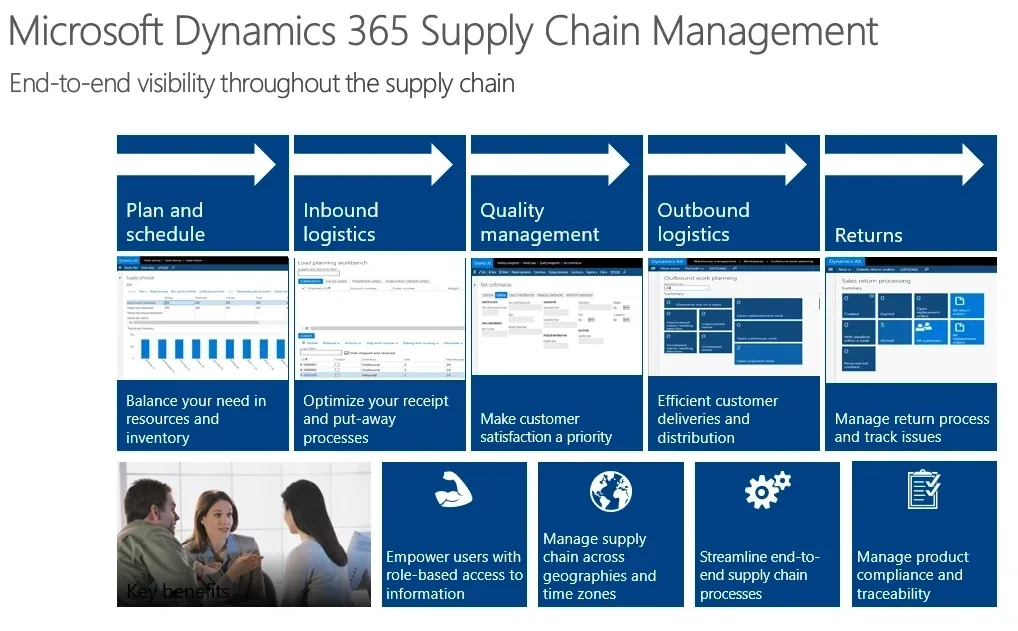In the fast-paced world of business, staying ahead of the competition requires more than just a keen eye for market trends. Efficient supply chain management is at the heart of a company’s success, ensuring that products move seamlessly from production to the customer. But what tools are essential for modern businesses to thrive? How can companies ensure they are not just keeping up, but leading the way in supply chain innovation? Enter D365 Supply Chain Management.

Table of Contents
ToggleUnderstanding Dynamics 365 Supply Chain Management
1. What is Dynamics 365 Supply Chain Management?
Dynamics 365 Supply Chain Management is a comprehensive solution designed by Microsoft to optimize every aspect of the supply chain. It integrates seamlessly with other Dynamics 365 applications and utilizes advanced technologies like AI to provide real-time insights and automation. But what sets it apart from other supply chain solutions?
2. Key Features and Capabilities
* Real-Time Inventory Visibility: Dynamics 365 offers real-time tracking of inventory across multiple locations, ensuring that businesses can make informed decisions quickly.
* Predictive Analytics: Leveraging AI, it provides predictive insights that help in demand forecasting, reducing the risk of overstocking or stockouts.
* Seamless Integration: Integration with other Microsoft applications such as Power BI and Office 365 enhances productivity and collaboration.
* Automation: Automated processes reduce manual errors and free up resources for more strategic tasks.
Enhancing Operational Efficiency
1. Streamlined Production Planning
Effective production planning is crucial for minimizing waste and maximizing efficiency. D365 Supply Chain Management offers tools for detailed production scheduling, capacity planning, and resource allocation. This ensures that production processes are as efficient as possible, reducing downtime and increasing output.
2. Optimized Warehouse Management
* Warehouse operations can often be a bottleneck in the supply chain. Dynamics 365 provides advanced warehouse management features, including:
* Advanced Picking and Packing: Streamline picking and packing processes to reduce errors and improve speed.
* Location Management: Optimize the use of warehouse space with intelligent location management.
* Inventory Control: Maintain optimal inventory levels with automated replenishment processes.
Improving Supplier Relationships
1. Supplier Collaboration
Building solid connections with suppliers is critical for a dependable supply chain. Dynamics 365 Supply Chain Management facilitates better communication and collaboration with suppliers through its supplier portal. This portal allows for:
* Real-Time Communication: Instant updates and communications streamline the procurement process.
* Performance Metrics: Track supplier performance to ensure they meet quality and delivery standards.
* Collaborative Planning: Work together with suppliers on demand planning and production schedules.
2. Procurement Automation
Automation in procurement processes can significantly enhance efficiency. Dynamics 365 enables automated procurement workflows, ensuring timely order placements and reducing administrative burden. This automation helps in managing contracts, evaluating supplier bids, and monitoring procurement activities in real time.
Leveraging Technology for Competitive Advantage
1. Supply Chain Visibility
The Internet of Things (IoT) plays a critical role in modern supply chain management. Dynamics 365 integrates IoT data to provide enhanced visibility across the supply chain. This includes:
* Asset Tracking: Monitor the location and condition of assets in real time.
* Predictive Maintenance: Use IoT data to predict and prevent equipment failures.
* Environmental Monitoring: Track conditions like temperature and humidity to ensure product quality.
2. Artificial Intelligence and Machine Learning
AI and machine learning are at the forefront of supply chain innovation. Dynamics 365 uses these technologies to:
* Demand Forecasting: Predict customer demand with high accuracy.
* Supply Chain Optimization: Identify and mitigate potential disruptions.
* Automated Insights: Generate actionable insights from vast amounts of data.
Driving Business Growth
Scalability and Flexibility
One of the key advantages of Dynamics 365 is its scalability. As your business grows, Dynamics 365 can easily adapt to increased complexity and volume. Its cloud-based architecture ensures that it can handle the demands of large enterprises while still being accessible to smaller businesses.
Customer-Centric Approach
In today’s market, customer satisfaction is paramount. D365 Supply Chain Management helps businesses adopt a customer-centric approach by ensuring timely deliveries, maintaining product quality, and offering transparent communication. This not only increases consumer pleasure but also fosters loyalty and encourages repeat purchases.

In conclusion, D365 Supply Chain Management offers a suite of essential tools for modern businesses to optimize their supply chains. From real-time inventory visibility to advanced analytics and seamless integration, it empowers companies to stay ahead of the competition. But the question remains: How will your business leverage these tools to transform your supply chain operations?
The answer lies in embracing the full capabilities of D365. By doing so, businesses can not only improve efficiency and reduce costs but also drive growth and enhance customer satisfaction. In the ever-evolving landscape of supply chain management, those who innovate will lead the way. Are you ready to take your supply chain to the next level?
